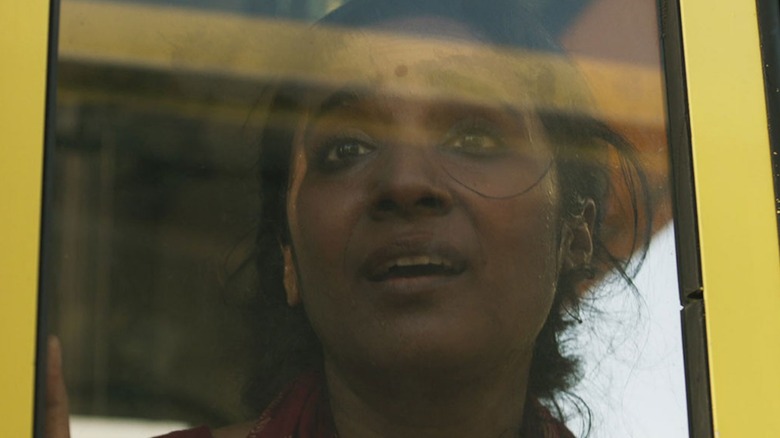Yellow Bus Review: How Far Will You Go For Justice? [TIFF 2023]
It's a sweltering day on the Arabian peninsula, but Ananda's (Tannishtha Chatterjee) family is happy. Ananda and her husband Gagan (Amit Sial) can barely keep their hands off each other, smiling at one another like newlyweds. Ananda lovingly and delicately prepares pomegranate for her two daughters' school lunches, six-year-old Anju (Kshethra Mithun) and older sister Ravina (Aarushi Laud). Ananda walks her kids to the bus, and waves excitedly as they drive away, the joy reciprocated in her daughter's faces.
But this gleeful day is about to come crashing down around them. Anju has fallen asleep on the school bus, and a series of small, unfortunate decisions compound, and Anju is left on the bus while the rest of the kids go to school. In the suffocating heat, Anju gets heat asphyxiation and dies. Ananda and Gagan are called into the school, believing their daughter has wet herself again. But the reality is far worse than they could have ever imagined.
The death has left Ananda's family completely broken. How does one even recover in the face of such tragedy and injustice? The dishes and tears pile up, suffering under the overwhelming grief. After the courts rule the situation a wrongful death, the school offers Ananda a cash settlement, a blood money payout to help the family deal with and ease their grief. Ananda, however, is deeply offended by the money, calling it a bride; seething, she tells the principal, "My daughter does not have a price."
This interaction spurs Ananda to fight for the truth. It's impossible for her to forget Anju, and the more she thinks about it, the more things don't seem to add up. The doll Anju had with her is gone — there's no trace of it on the bus where they found her. Other details feel off — the bus door was jammed when Ananda dropped them off, but this bus has a perfectly functioning door. But the deeper Ananda gets into seeking justice for Anju, the more she drives herself from the family she already has, who want to try and pick up the pieces and carry on as a family without their beloved Anju.
In "Yellow Bus," cultures are clashing — Ananda's Hindu faith does not allow her to accept money. But where they've moved to it's a perfectly normal practice. Writer-director Wendy Bednarz's script often strives too much for generality, painting the class and race struggles of Ananda's family with broad strokes. In one scene, the principal's daughter remarks "Imagine what it's like to live where you're treated like you're invisible" about Ananda, but we never get a sense of how that manifests in Ananda's life. But while the screenplay goes overly general to feel more universal, it actually ends up making the story lose its specificity, refusing to even pinpoint where "Yellow Bus" takes place (It takes place along the Arabian Gulf, which narrows it down to about nine countries). It's as if the film really wants to make clear that this could happen anywhere, without realizing that losing a child and wanting justice is about as relatable an idea as you can get.
Fighting for what's right
There are very specific cultural elements in "Yellow Bus" — the concept of blood money, for example — but it's hard to understand it when we don't understand where we are. By trying to go too general in its themes, the film misses much of the emotional potency, and ironically, genuine universality it could have. Ananda and her husband immigrated from India, and they've never quite felt at home — another element that so many people could relate to, but it's something that film largely brushes over in favor of its more procedural elements.
Chatterjee is exceptional as Ananda. Her role is complicated — Ananda is unquestionably noble in her quest to receive proper justice for her daughter's unnecessary death, but "Yellow Bus" keenly reckons with the cost of Ananda's desire for justice. She's torn between what's left of her family and the truth of what happened to Anju. Her relationship with her husband and elder daughter is particularly fraught and at breaking point. Ananda is exceptionally harsh to Ravina, her surviving daughter — it's clear she's unable to forgive Ravina for not protecting Anju as she asked, even if that's an unfair burden to place upon anyone, let alone a child. A mission like Ananda's would often be dealt with heroically, but Chatterjee and Bednarz's approach is far more nuanced, and the film is all the better for it. At its core, Chatterjee's performance evokes incredible pain and torment, a mother shattered by the loss of her youngest daughter — a loss that never should have happened.
The film meanders a bit too much in its pacing, really stewing in grief and anger, making it a challenging watch. It feels like there's a more compelling story hiding underneath. But there's still plenty to admire in "Yellow Bus" — especially Chatterjee's great performance — a searing portrait of perseverance. Sometimes, even in the most impossible circumstances, you need to take a step back and assess the situation. Doing the right thing is different in every circumstance, and sometimes, it may be the opposite of what you think it might be.
/Film Rating: 7 out of 10

